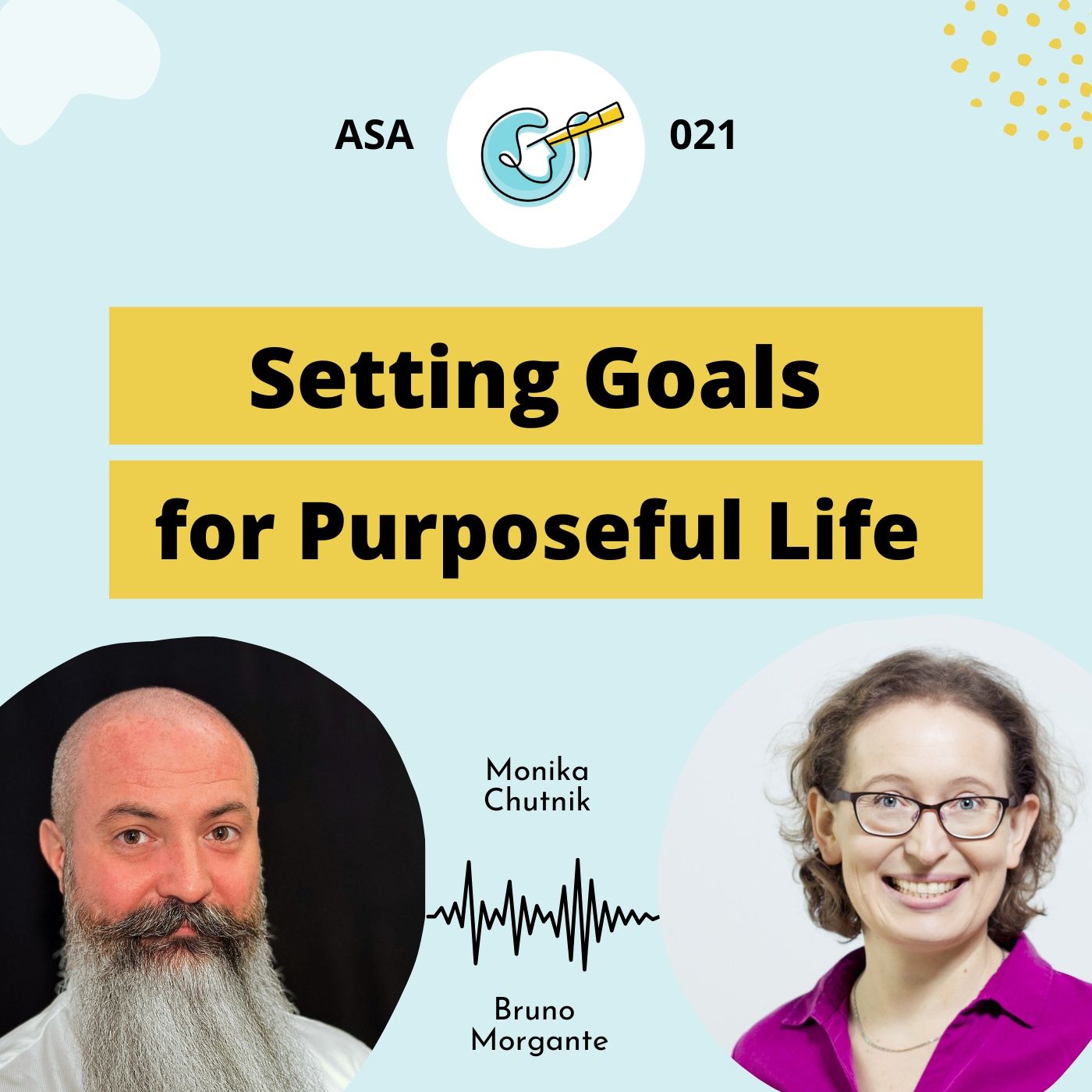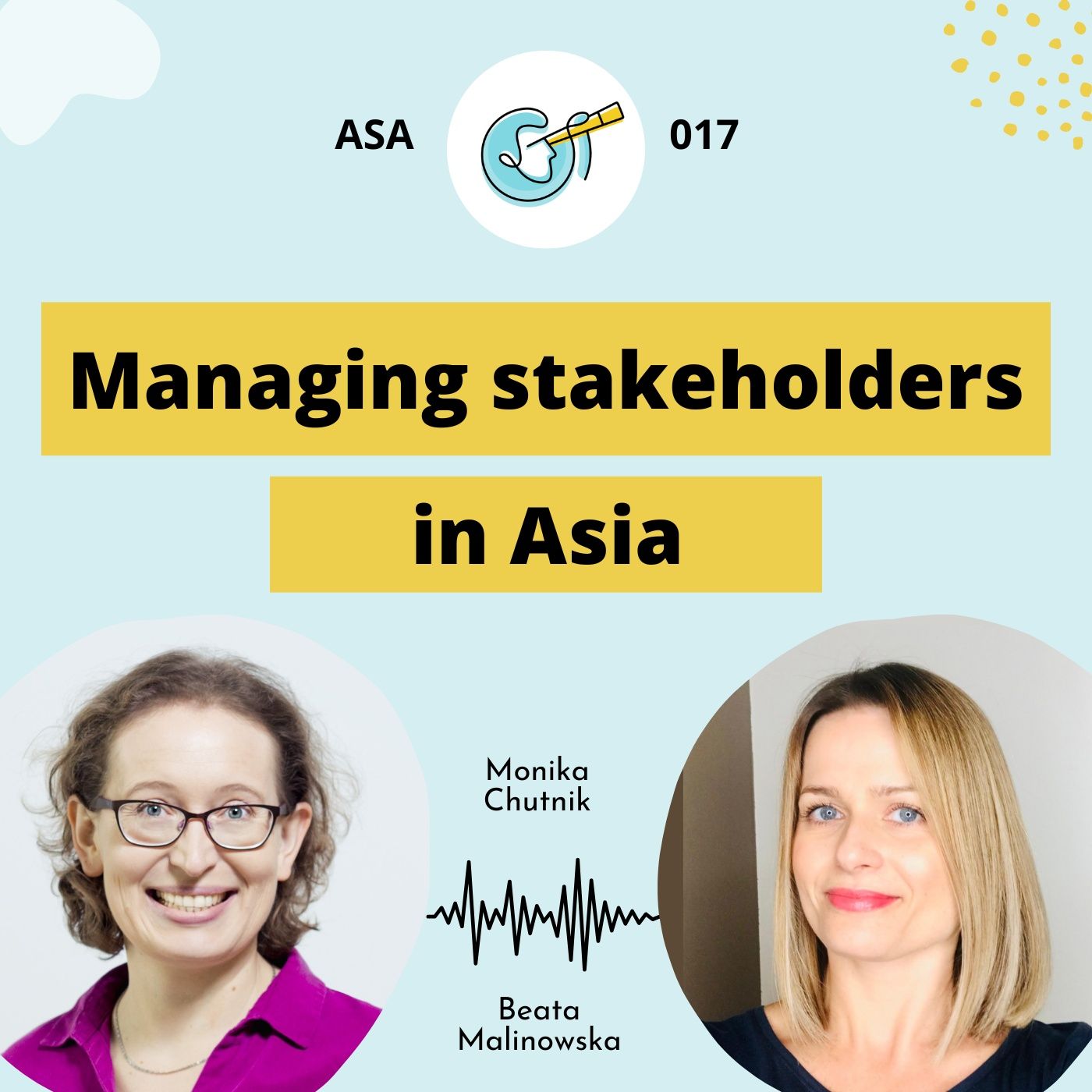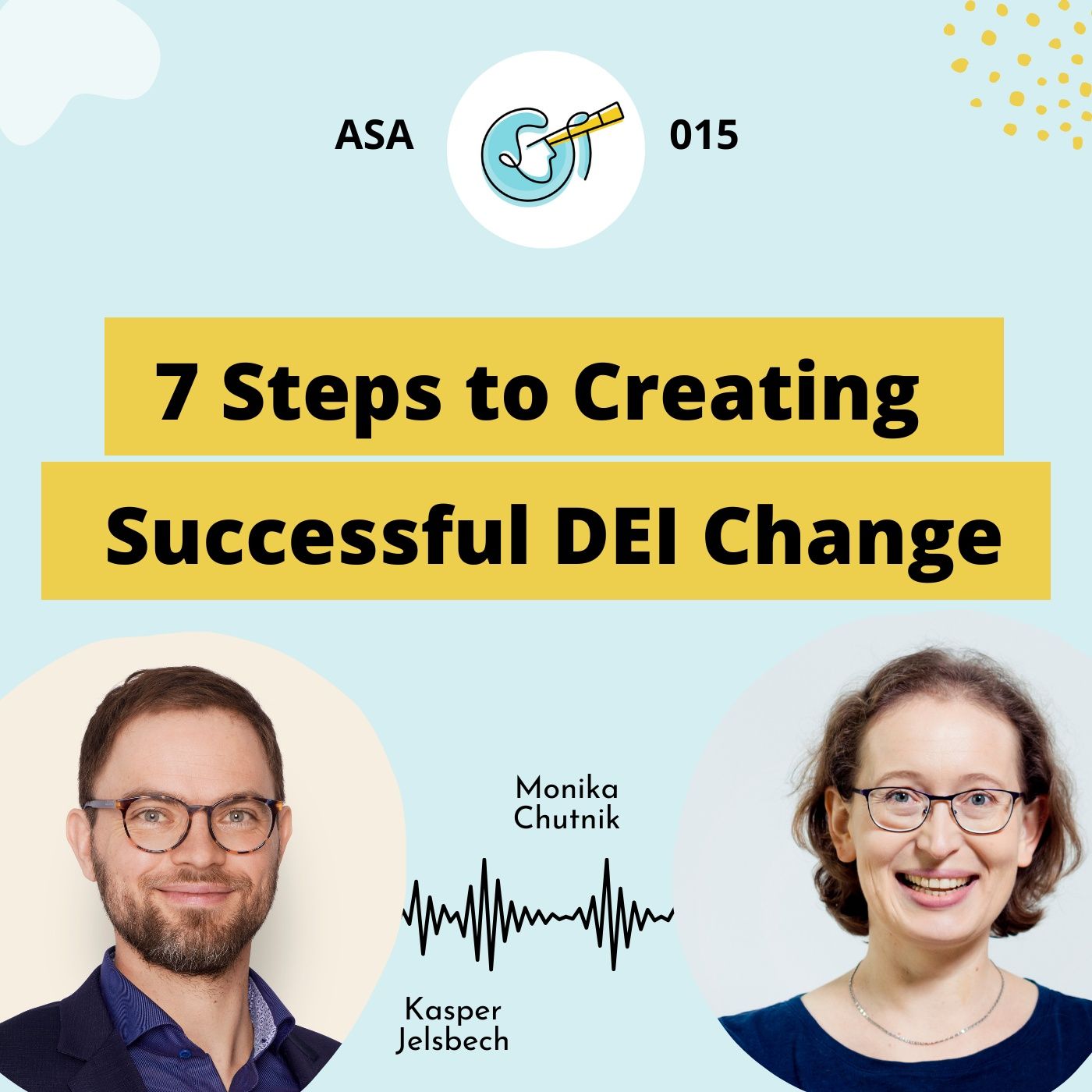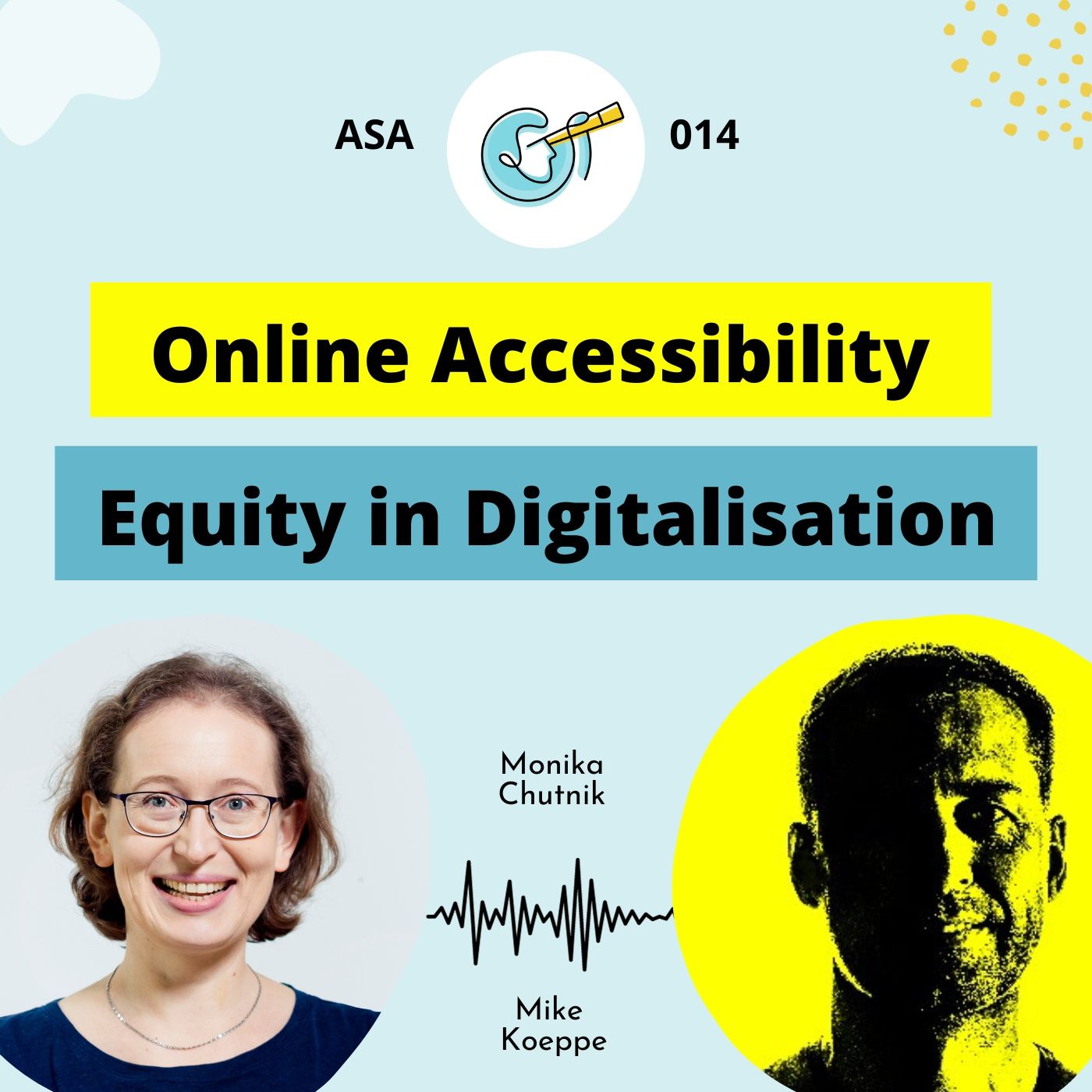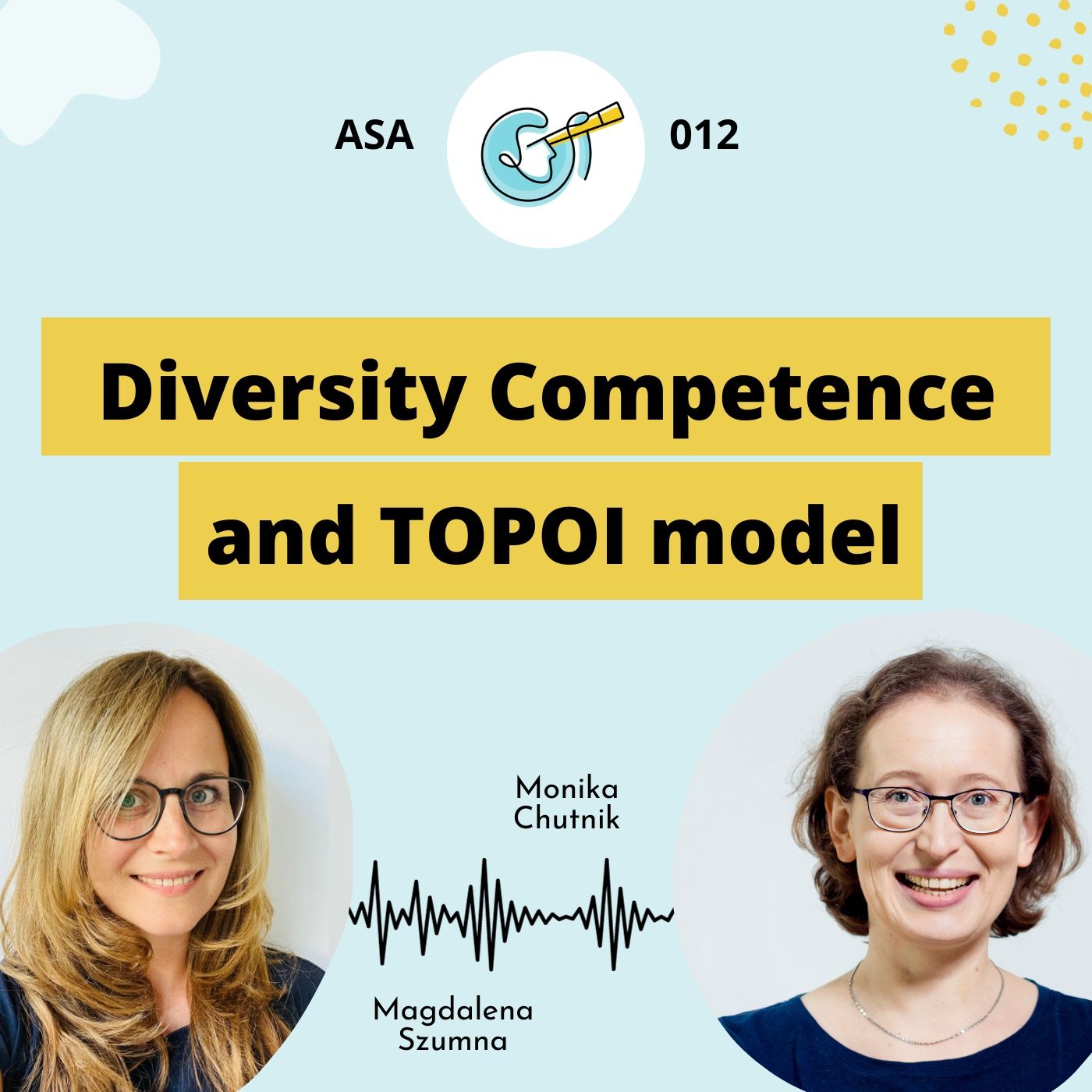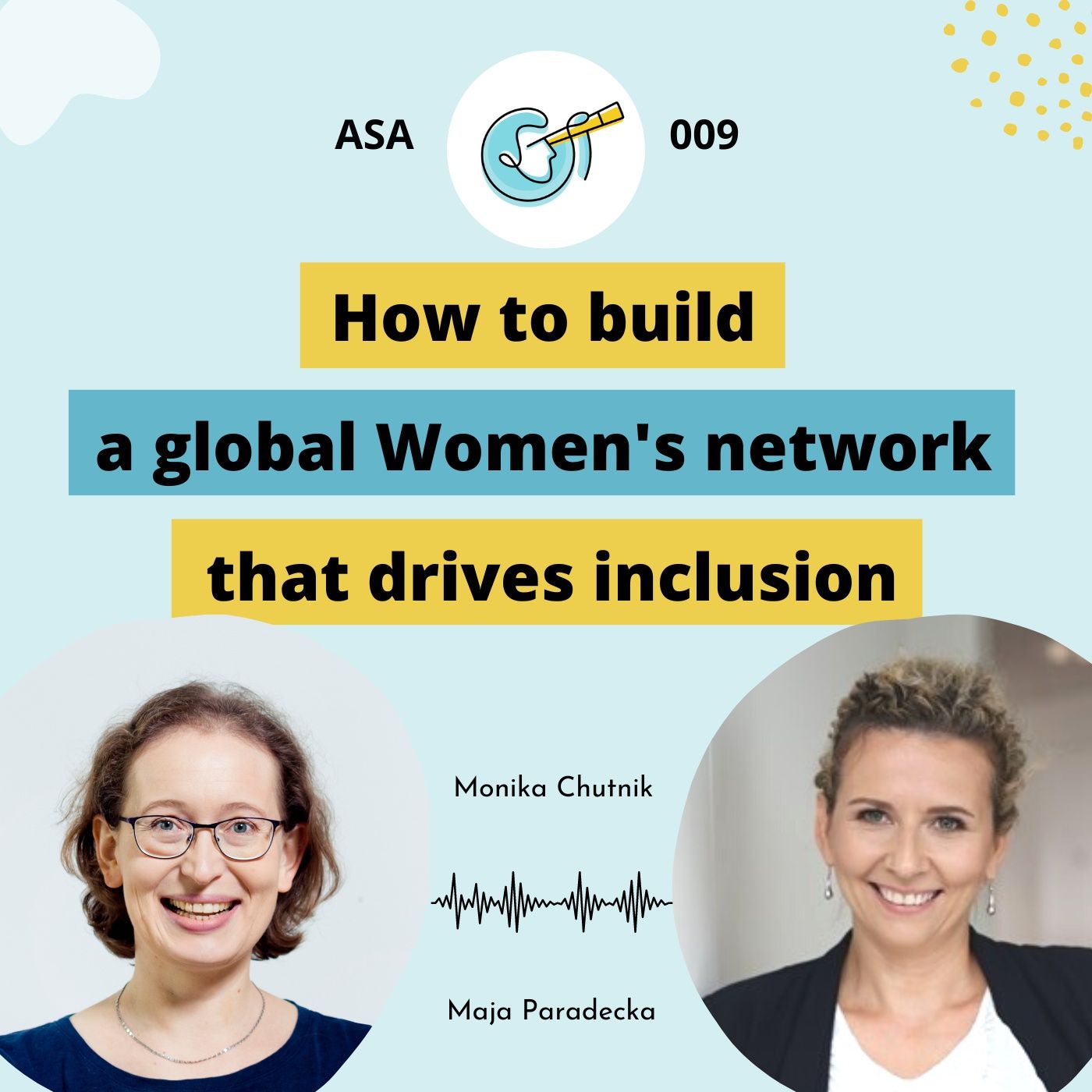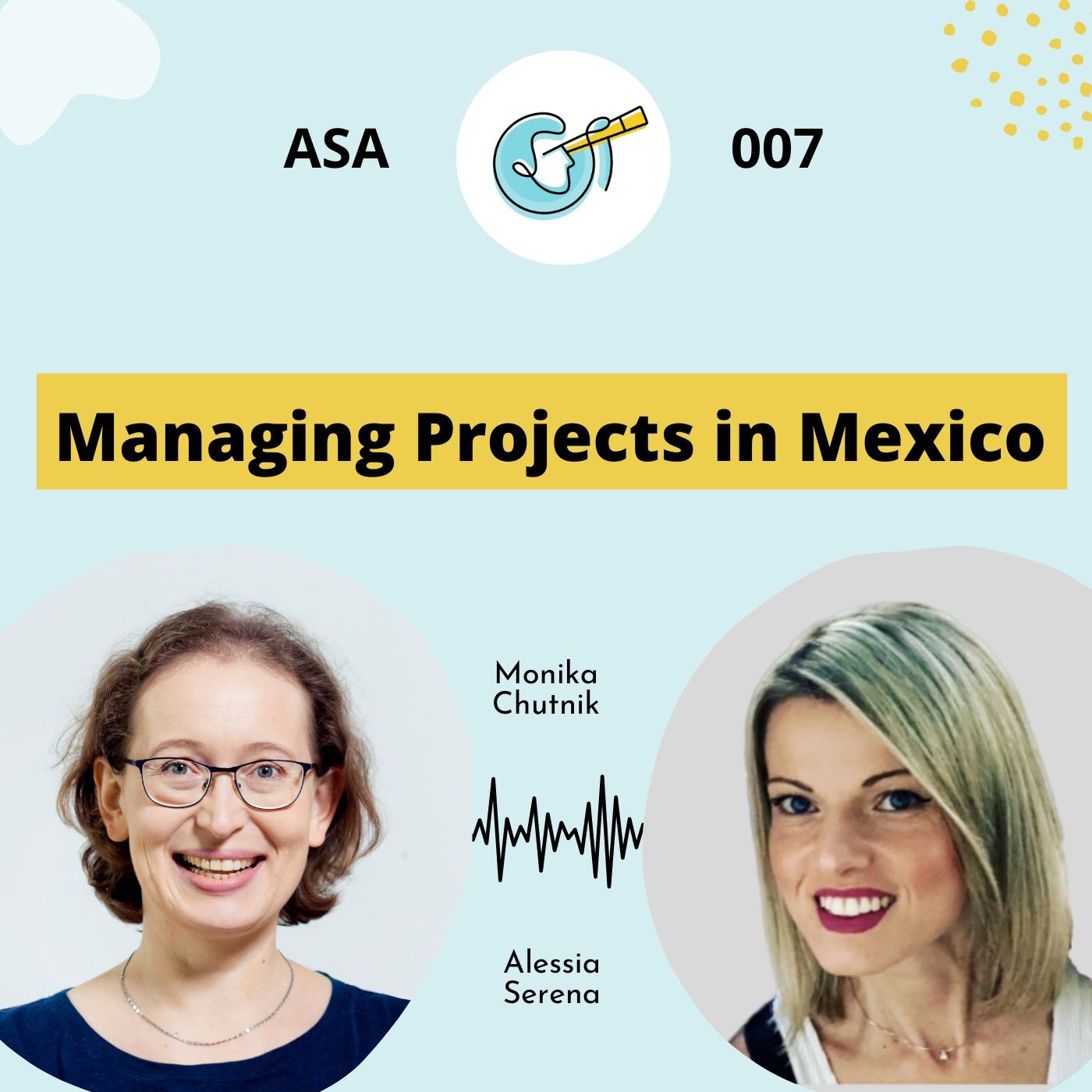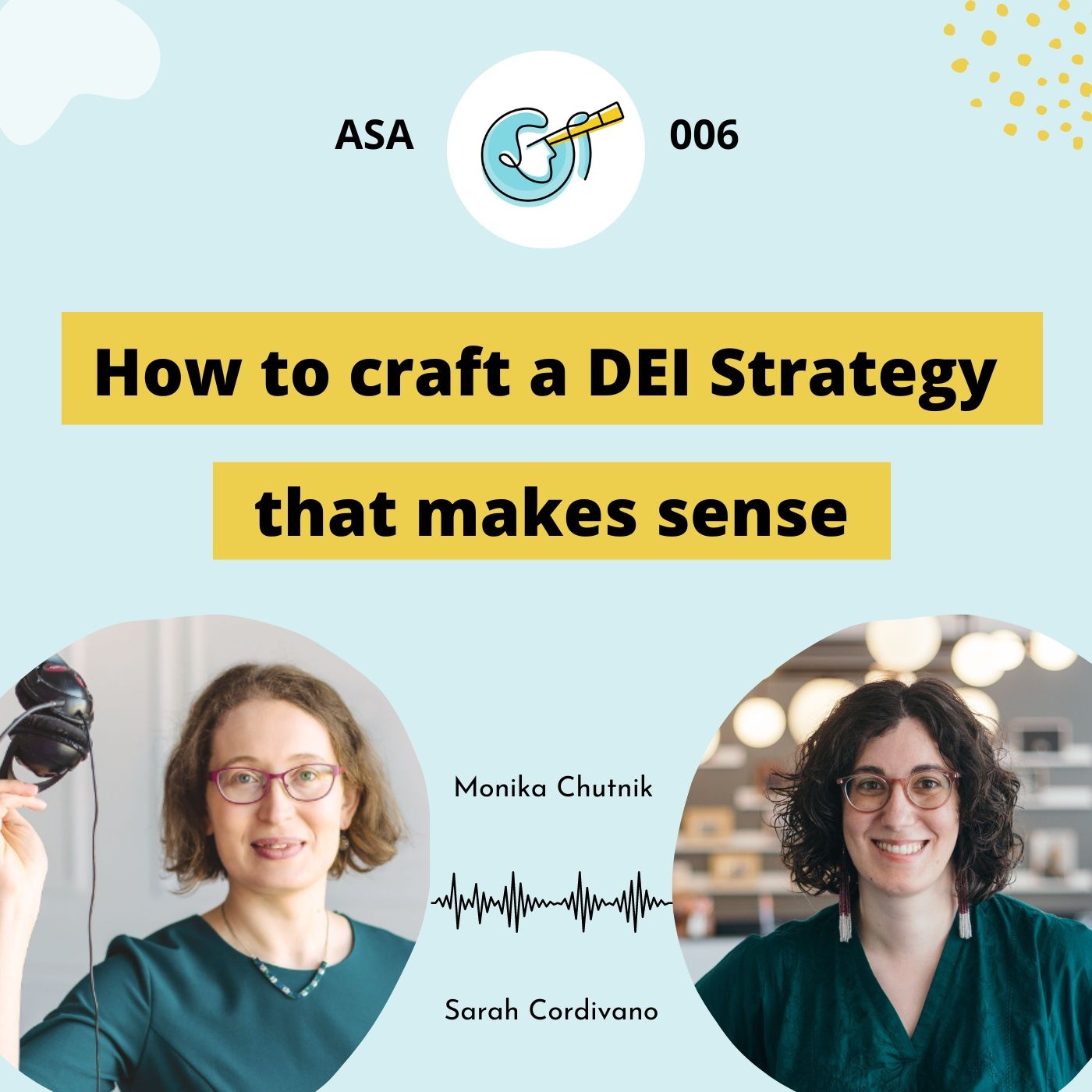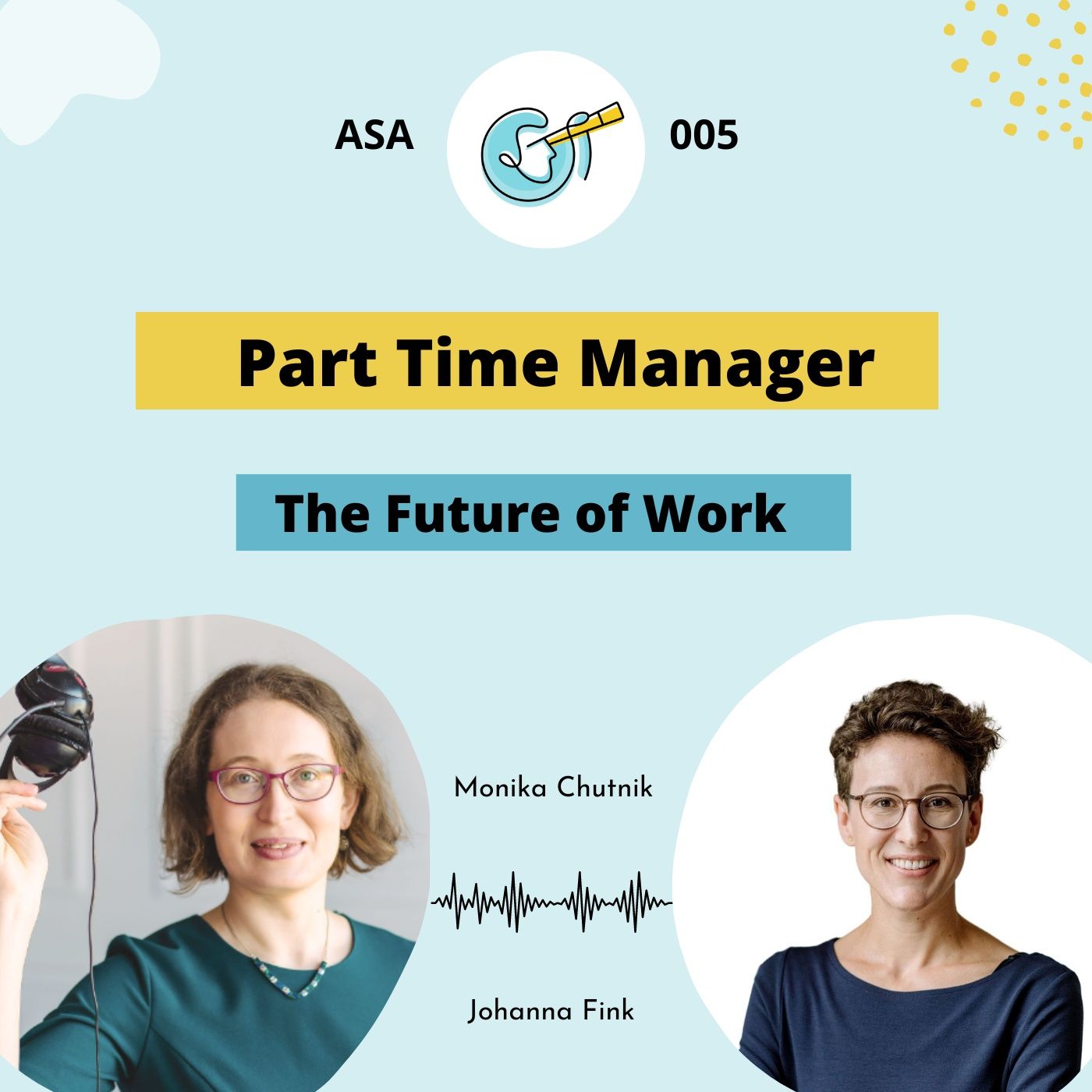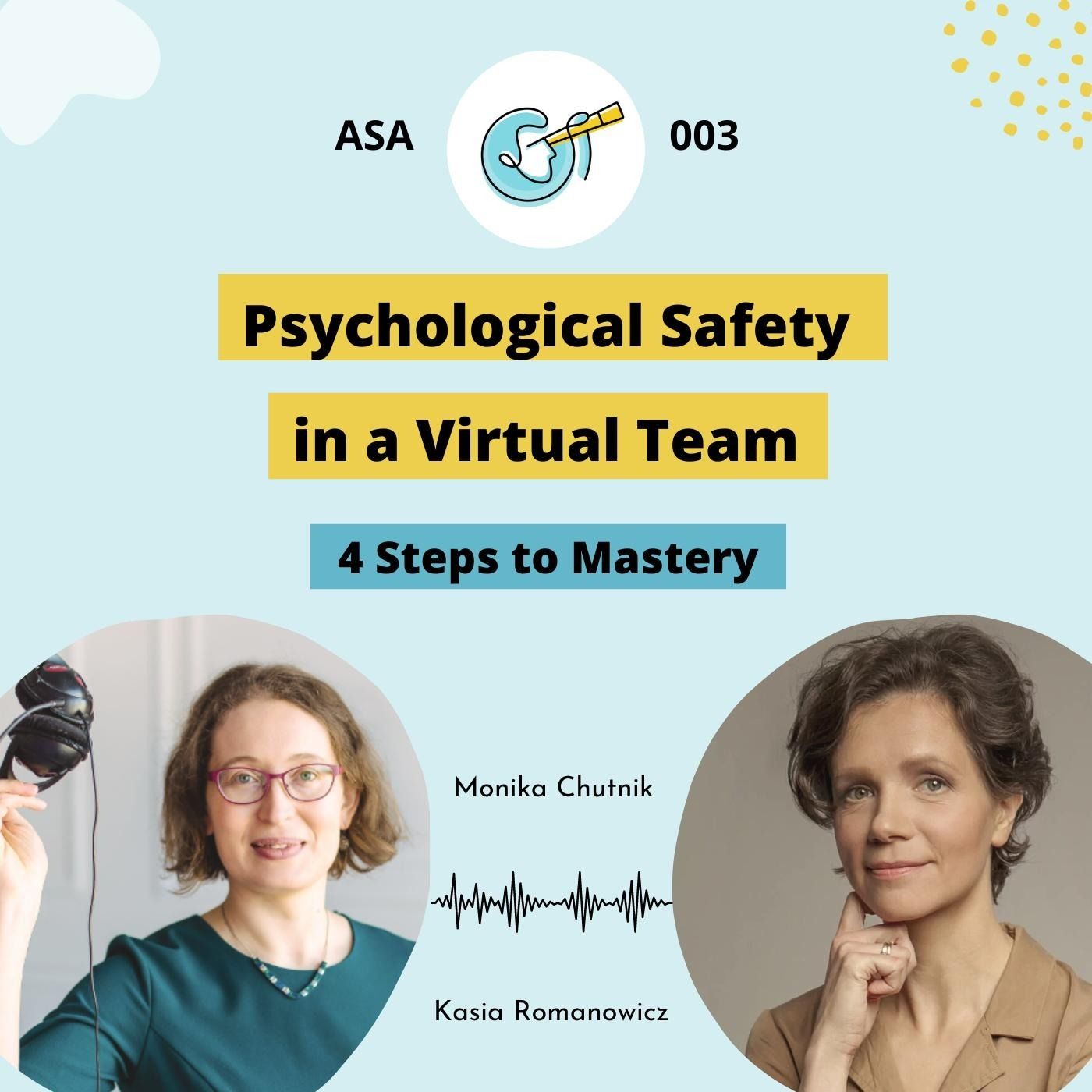Discover A Step Ahead by Monika Chutnik
A Step Ahead by Monika Chutnik

A Step Ahead by Monika Chutnik
Author: Monika Chutnik
Subscribed: 0Played: 0Subscribe
Share
© Copyright Monika Chutnik
Description
A Step Ahead is a podcast for those who make change happen. You might be a manager or leader, HR or a consultant, or even an individual person working in an international or virtual setting. Find hints and benchmarks on staying ahead with your team, your company, and even in your own life.
We are discussing here everything related to
- intercultural communication, cooperation and management
- Virtual and hybrid teams
- being a leader for your people and leading your own life
Find more benchmarks and content on www.stepahead.pro
Join the other listeners and stay a step ahead!
Monika Chutnik
We are discussing here everything related to
- intercultural communication, cooperation and management
- Virtual and hybrid teams
- being a leader for your people and leading your own life
Find more benchmarks and content on www.stepahead.pro
Join the other listeners and stay a step ahead!
Monika Chutnik
21 Episodes
Reverse
When we think about setting goals, we usually relate to the business context. But aren't we in need of setting goals for our lives as well? Or is there a difference between setting a goal, setting an objective, maybe setting a direction? That's a very interesting topic to discuss and I'm having a very great guest to be discussing this topic today, Bruno Morgante. By no coincidence he is talking about goals because he knows a lot about that in his life.In this episode you will learn:why setting goals is essential for creating a purposeful lifehow clear objectives act as your compass during turbulent timesthe difference between outputs, outcomes, and real value in both life and project managementwhy achieving goals is less important than the transformation you experience along the wayhow to start setting realistic yet ambitious objectives that spark growthwhat a winning mindset means and how it connects to personal and professional successFind more materials at www.astepahead.pro/021When you listen to this episode, think of someone who would also listen to it for the benefit of themselves or their team and share the link to the recording.I wish you a sense of fun and discovery!Do you want to be kept up to date? Subscribe to the newsletter: www.astepahead.pro/newsletter
In Poland, we have a saying: A Pole and a Hungarian are like two brothers. We both like to fight, and we both like to drink. That’s how the saying goes. I think this is what many people commonly imagine about Hungarians—and about working with them.Now, we can assume that this saying, which blends humor with stereotype, might contain a grain of truth. But I believe—and I’m quite convinced—that there’s much more to know about Hungary and Hungarians than what this little proverb suggests.In this episode you will learn:Why Hungarians might seem reserved—and what it really meansHow handshake customs differ in Hungary compared to other countriesThe role of food, drinks, and small talk in building business relationshipsWhy learning just a few Hungarian words can make a big differenceHow Hungarians give and receive feedback at workWhat to avoid in early conversations (hint: politics!)How historical events still influence Hungarian drinking habitsThe difference between direct and indirect communication styles in HungaryTips for working effectively with Hungarian colleagues—virtually or in personWhy building trust takes time, but lasts long in Hungarian cultureFind more materials at www.astepahead.pro/020When you listen to this episode, think of someone who would also listen to it for the benefit of themselves or their team and share the link to the recording.I wish you a sense of fun and discovery!Do you want to be kept up to date? Subscribe to the newsletter: www.astepahead.pro/newsletter
When you cooperate with people from Poland, especially when you run meetings or trainings—whether face to face or online—you might face the challanges. Many of my international colleagues, particularly those coming from Western European and North American countries, feel a bit insecure about how to read reactions from us.By “us,” I mean Polish people, but also more generally people from Central and Eastern Europe, because it seems that the type of reactions and behaviors in meetings is quite similar across our part of Europe. In this episode you will learn:Why CEE audiences often stay silent or hesitate to speak in meetingsHow history, education, and hierarchy shape communication in CEEWhy leaving space to speak is key—and why interrupting is avoidedHow fear of making mistakes in English holds people backHow to spot and engage quieter participants in mixed cultural groupsTools and techniques to boost engagement in CEE teamsWhy setting expectations upfront makes a big differenceHow small groups, anonymous tools, and personal stories can encourage interactionWhy managers should speak last to get honest opinionsFind more materials at www.astepahead.pro/019When you listen to this episode, think of someone who would also listen to it for the benefit of themselves or their team and share the link to the recording.I wish you a sense of fun and discovery!Do you want to be kept up to date? Subscribe to the newsletter: www.astepahead.pro/newsletter
How open are we to language acquisition? This is what we are discussing in today's episode.We work a lot with international audiences and international teams, and it seems that language plays an important role here. This is why I'm so glad to have Vladislav Alehno as my guest. Vlad is not just a polyglot — he is a hyperpolyglot.In this episode you will learn:Why calling a language "foreign" can block your progress — and what to say instead.How to connect with a language emotionally, not just intellectually.Why "complex" is better than "difficult" when describing languages.How Vlad learned French fluently in just one year using natural immersion.Why attitude matters more than talent in language learning.Simple first steps to start learning any language.How languages build bridges — and become part of your personal story.Find more materials at www.astepahead.pro/018When you listen to this episode, think of someone who would also listen to it for the benefit of themselves or their team and share the link to the recording.I wish you a sense of fun and discovery!Do you want to be kept up to date? Subscribe to the newsletter: www.astepahead.pro/newsletter
Visiting a place for a holiday is not the same as working hand in hand with local professionals, managing projects together, and navigating shared responsibilities.Today, I’m joined by a special guest who knows this world from the inside out: Beata Malinowska, who shares her real-life experience of working across Asian cultures—not just Asia as a region, but as a collection of distinct countries, customs, and ways of doing business.In this episode you will learn:How to build trust with stakeholders in AsiaKey cultural differences across Asian countriesWhy humility matters in international projectsHow to deal with ambiguity and uncertaintyWhat to know about hierarchy and communicationGender dynamics in Asian business environmentsHow to adapt your leadership style by regionThe impact of strong company cultureTips for preparing to work abroadWhy mindset and empathy are game-changersFind more materials at www.astepahead.pro/017When you listen to this episode, think of someone who would also listen to it for the benefit of themselves or their team and share the link to the recording.I wish you a sense of fun and discovery!Do you want to be kept up to date? Subscribe to the newsletter: www.astepahead.pro/newsletter
When you think about storytelling and business, there is a question how you can combine these two areas. Let me tell you, the connection is just amazing and fascinating. It's very, very, very strong and I have a great guest - Yingdan Liu - who can tell us more about how it works, what it is and why it is so important to have storytelling skills especially when you are a leader. In this episode you will learn:Why storytelling?Why is storytelling so adequate in business?What are the necessary elements of a story?The Five S model for creating good storiesThe most common myths about storytellingWill artificial intelligence replace storytellers?How one story can change a person's life?Find more materials at www.astepahead.pro/016When you listen to this episode, think of someone who would also listen to it for the benefit of themselves or their team and share the link to the recording.I wish you a sense of fun and discovery!Do you want to be kept up to date? Subscribe to the newsletter: www.astepahead.pro/newsletter
In this episode, I'm having a special guest, who can tell us a bit more about how we can really put a little bit of brain into all our hard attempts and how to apply a structured approach to creating DEI change. Kasper Jelsbech has dedicated a big part of your professional life to diversity, equity, and inclusion. He works as partner and chief consultant at a company called Living Institute.In this episode you will learn:What does a systemic approach to DEI start from?Should you rather focus on diversity or inclusion?What are the 7 steps that an organization needs to take before it starts adjusting its processes?What's the right sequence of actions?What is a nonpromotable task?How much time does it take to create a sustainable culture change in a company?Find more materials at www.astepahead.pro/015When you listen to this episode, think of someone who would also listen to it for the benefit of themselves or their team and share the link to the recording.I wish you a sense of fun and discovery!Do you want to be kept up to date? Subscribe to the newsletter: www.astepahead.pro/newsletter
We talk a lot about managing diversity, about diversity of people, and about the beautiful performance, which is possible thanks to diversity in organizations. But have we made sure before that this diversity actually can work in practice? Can all the kinds of people access the resources of our company? That's the question.Today, I'm talking to Mike Koeppe about online accessibility for people with visual impairments, and I think this is going to be a very interesting topic. On this occasion you can also see how people just before total sight loss see - just take a look at the guest photo on the cover of this podcast episode!In this episode you will learn:Figures for visual impairmentsWhy accessibility is a business issueInclusive company's best practice"You don't see what they don't see"Personal storiesStatistics from workplacesWCAG - Web Content Accessibility GuidelinesWhen we talk about inclusive workplaces, we focus a lot on the mindset. We focus a lot on inclusive leadership. We also talk about inclusive policies. But today, we talked about some really technical levels of being accessible, of being inclusive.Find more materials at www.astepahead.pro/014When you listen to this episode, think of someone who would also listen to it for the benefit of themselves or their team and share the link to the recording.I wish you a sense of fun and discovery!Do you want to be kept up to date? Subscribe to the newsletter: www.astepahead.pro/newsletter
The world of work is changing. And what is changing among others is the generations that we have in workplace. Now slowly but inevitably, I'm discovering that I'm starting to belong to the older generations in the workplace. But it also makes me very curious about what are the younger generations like. What makes them like this? How do they approach certain things?Today, we will be talking about a specific aspect, maybe a little bit unexpected aspect of generation Z, the youngest generation in our job market. I'm having Marta Leszczyńska as my guest. And I'm going to ask many questions about Marta's experience with GenZers.In this episode you will learn:What is Gen ZWhat is technological shameTech shame at workTechnological competence of GenZHow GenZers learn new skillsHow to address tech shame in companyHints for HR and leadersFind more materials at www.astepahead.pro/013When you listen to this episode, think of someone who would also listen to it for the benefit of themselves or their team and share the link to the recording.I wish you a sense of fun and discovery!Do you want to be kept up to date? Subscribe to the newsletter: www.astepahead.pro/newsletter
More and more frequently we talk about diversity, equity and inclusion. My impression is that we get a lot of DEI guidelines, but they show us how to behave in a specific situation. I'm very glad to have Magdalena Szumna as a guest today. We are going to explore a little bit more practical approach to dealing with situations related to diversity, equity, and inclusion.In this conversation you will learn:Why diversity competence is importantWhat is diversity competenceAbout TOPOI modelHow to use TOPOI model - case studiesHow to develop diversity competenceFind more materials at www.astepahead.pro/012I wish you a sense of fun and discovery!
Many managers suffer from the challenge of being in touch with their people, of keeping the relationship. And what becomes even more difficult is having a dialogue. What do we do in a situation when there is a polarized dialogue? How to run it?I have invited an amazing expert who can tell us a lot about how to do dialogue and, maybe even more importantly, how to depolarize dialogue in case it goes the wrong way. Maja Nenadović is my guest today. In this conversation you will learn:Why to have a dialogue in a workplaceWhat happens if we enter a dialogueWhy conflict is an opportunityHow to find courage to start a dialogueHints and tips for running a dialogueExamples of useful questionsRole of HR in creating a dialogueWhat is deep listening and why it is so importantFind more materials at www.astepahead.pro/011I wish you a sense of fun and discovery!
In this captivating episode of "A Step Ahead by Monika Chutnik" Jana Holla provides us with a unique glimpse into the vibrant world of Egypt, emphasizing the value Egyptians place on relationships, the cultural nuances that shape their interactions, and the challenges faced by expatriates in this enchanting land. Join Monika and her guest as they explore the joy of relationships and the complexities of life in Egypt.In this conversation you will learn:What are main cultural beliefs and values in EgyptHow it is to be a foreign woman living in EgyptThe importance of relationships in Egyptian societyEuropean perspective on Egyptian cultureTips for living and working in EgyptFind more materials at www.astepahead.pro/010I wish you a sense of fun and discovery!
In this episode of A Step Ahead podcast Monika Chutnik is talking with Maja Paradecka from Kemira company on how to build a global women's network that drives inclusion.In this conversation you will learn:Why to talk about the women's networkStory of Women's Network in KemiraHow to start and develop a women's networkHow to make a women's network globalTips and tricks for other organizationsFind more materials at www.astepahead.pro/009I wish you a sense of fun and discovery!
This podcast, A Step Ahead, has been created for all who want to grow in such an international, remote environment – who want to grow as leaders, as HR, as change agents, and simply as humans. I will be delighted to know how you make progress at work and in life - Monika Chutnik.Materials are available at www.astepahead.pro/008In this episode I am talking with Kathy Borys Siddiqui about Danish business culture and how to make friends with the Danes.In this conversation you will learn:What is Denmark like?Moving to another countryHygge in practiceDanish sense of humourHow to make friends with Danes?Danish corporate cultureAs you listen to this episode, think of someone who would also listen to it for the benefit of themselves or their team and share the link to the recording.Sign up for the newsletter to stay in touch: https://astepahead.pro/newsletter/
This podcast, A Step Ahead, has been created for all who want to grow in such an international, remote environment – who want to grow as leaders, as HR, as change agents, and simply as humans. I will be delighted to know how you make progress at work and in life - Monika Chutnik.Materials are available at www.astepahead.pro/007In this episode I am talking with Alessia Serena, an experienced manager in HR and Project Management.In this conversation you will learn:What was the biggest surprise in working with Mexicans?How to build relationships with Mexicans?What is the Mexican approach to time?What does "ahorita" mean and how do you interpret such a response?How are deadlines set in a collaboration?What is the role of the project leader? What is expected of the boss?How were Italians perceived by Mexicans?What will Mexicans not tolerate when it comes to work behavior?What to watch out for so as not to offend the feelings of their Mexican colleagues?What do Poles and Mexicans have in common?What are the key tips for successful cooperation with Mexicans?As you listen to this episode, think of someone who would also listen to it for the benefit of themselves or their team and share the link to the recording.Sign up for the newsletter to stay in touch: https://astepahead.pro/newsletter/
This podcast, A Step Ahead, has been created for all who want to grow in such an international, remote environment – who want to grow as leaders, as HR, as change agents, and simply as humans. I will be delighted to know how you make progress at work and in life - Monika Chutnik.Materials are available at www.astepahead.pro/006In this episode I am talking with Sarah Cordivano about how to craft a DEI strategy that makes sense.In this conversation you will learn:How to set up DEI strategy in a companyChallenges in implementing DEI strategyHow to find the sponsorship of the executive levelRole of the mid-level managers in activating the DEI strategyWhat are the three things to do in order to start DEI within the companyThis episode might be interesting for leaders who have a direct influence on inclusion and diversity programs in their teams, but also for HR who creates development programs for employees. I wish you a sense of fun and discovery!
This podcast, A Step Ahead, has been created for all who want to grow in such an international, remote environment – who want to grow as leaders, as HR, as change agents, and simply as humans. I will be delighted to know how you make progress at work and in life - Monika Chutnik.Materials are available at www.astepahead.pro/005In this episode I am talking about Part Time Manager with Johanna Fink.In this conversation you will learn:Why it's no longer an option but rather a business nececity to have part time solutions availableHow part time management is related to DEIWhat are surprising benefits created by working part timeWhat are some challenges faced by people working as part time managersHints and tips about what you might do as an organisation to enable part time solutions that fit you the bestThis episode might be interesting for leaders who have a direct influence on inclusion and diversity programs in their teams, but also for HR who creates development programs for employees. I wish you a sense of fun and discovery!
This podcast, A Step Ahead, has been created for all who want to grow in such an international, remote environment – who want to grow as leaders, as HR, as change agents, and simply as humans. I will be delighted to know how you make progress at work and in life - Monika Chutnik.Materials are available at www.astepahead.pro/004In this episode I am talking about "What are Microaffirmations and why you want to have them in your team". With me there is Ben Capell, experienced consultant, expert and trainer.In this conversation you will learn:What are microbehaviours and why do they matter?How microbehaviours translate into performance?Who can actually impact the microbehaviours in a team?This episode might be interesting for leaders who have a direct influence on inclusion and diversity programs in their teams, but also for HR who creates development programs for employees. I wish you a sense of fun and discovery!
This podcast, A Step Ahead, has been created for all who want to grow in such an international, remote environment – who want to grow as leaders, as HR, as change agents, and simply as humans. I will be delighted to know how you make progress at work and in life - Monika Chutnik.Materials are available at www.astepahead.pro/003In this episode I am talking about Psychological Safety - what is it and how to get it in business and in teams. With me there is Kasia Romanowicz, experienced leadership trainer and consultant, working for ETTA Leadership & Consult. In this conversation you will learn:Why to care about psychological safety in business?What does psychological safety comprise of?What are the levels of psychological safety?What you can do as a leader to ensure or increase psychological safety in your team?What leaderships skills are helpful for enabling psychological safety in your team?This episode might be interesting for leaders who have a direct influence on psychological safety in their teams, but also for HR who creates development programs for employees. I wish you a sense of fun and discovery!
This podcast, A Step Ahead, has been created for all who want to grow in such an international, remote environment – who want to grow as leaders, as HR, as change agents, and simply as humans. I will be delighted to know how you make progress at work and in life - Monika Chutnik.Materials are available at www.astepahead.pro/002In this episode I’m talking to Hanna Yankina, who comes from Ukraine and works as an IT recruiter in Poland. She is sharing her experience and knowledge about Ukrainian work culture, needs of Ukrainian employees in Europe and she also gives advices on how to prepare the good recruitment and onboarding processes.What you will learn from this episode:What working style you can expect from Ukrainian colleaguesWhat you can do to find great candidatesWhat you can do to ensure a great onboarding into your team and companyWhat you can do to ensure a great experience of working together with Ukrainans in your businessI wish you a lot of inspiration!


